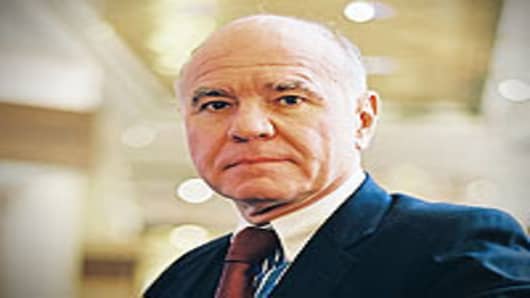You won't often find Marc Faber and Jeremy Siegel taking the same side of an argument, but both market gurus believe that, despite the global turmoil, investors are better off with stocks than government bonds.
Faber, the noted bear and author of the Gloom Boom & Doomreport, and Siegel, the bullish Wharton School professor, believe that with negative real bond yields prevailing there's little choice but to pick stocks.
"Everything looks bad at the present time and people are relatively bearish. At the same time, you have the 10-year note at less than 1.5 percent and you have stocks like Johnson & Johnson yielding almost 4 percent," Faber pointed out during a Monday "Squawk Box" appearance on CNBC.
"I'm not saying Johnson & Johnson won't go down with the rest of the market, but if you have a time horizon of 10 years, I believe you're going to make more money in Johnson & Johnson than you will in U.S. government bonds," he said.
Siegel has been making the same point for some time now, telling hedge fundmanagers at May's Skybridge Alternatives, or SALT, conference in Las Vegas that investors don't even need the market to go up to make money in the stock market.
Dividend gains alone are reason enough to turn from government bondsand towards equities, he said during a live segment with Faber.
"This is the first time in 60 years that dividend yields on the market exceed long-term interest rates. It's the first time in 60 years when you don't need gains in stocks, that you don't need higher returns than gains in bonds," Siegel said. "You don't have to worry so much about the day-to-day volatility if the corporation, if the firm has good coverage on its dividend, because it's going to continue to pay."
Falling commodity prices, particularly in oil, add a "side benefit" for consumers and investors, Siegel said.
"Slow growth, no recession , earnings flat but dividends well-covered — I think it's still a very, very good story for stocks," he said.
Of course, the two aren't in full agreement.
Siegel believes the global economy will keep growing, albeit slowly — he called on the European Central Bank to guarantee major bank deposits as a way to stave off a full-blown financial crisis — but Faber thinks things are worse than the economic reports are showing.
"I'm convinced that Europe is actually in recession today ... There is a meaningful and more substantial slowdown in China than the official statistics would suggest," Faber said. "At the present time there probably is hardly any growth at all, so that slows down the demand for industrial commodities. That then slows down the production in countries that produce industrial commodities."
He added: "So you have essentially a chain, a vicious spiral going through the global economy, which means that corporate profits in the U.S. ... will disappoint."



